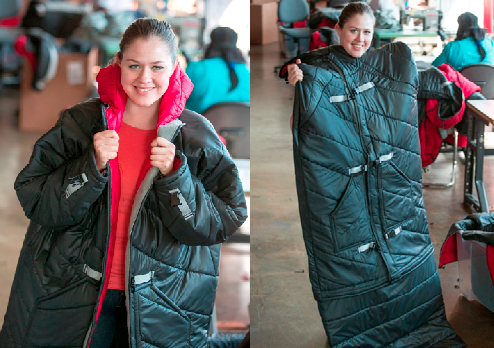Empowerment Plan
The Empowerment Plan in Detroit produces a highly insulated coat which can be a hold-all and a sleeping bag. They are also training people. Jenny McBain speaks to its young founder. //
Veronika Scott is from Detroit and still in her early twenties but she is already making strides as a social pioneer, successfully battling to improve the lives of homeless people on and off the street. What started as a college design project has turned into a ‘tried and tested’ method of getting homeless single mothers off the streets and into employment and housing and providing comfort for those without a home.
Her workers manufacture highly insulated coats which can be turned into sleeping bags or an over-the-shoulder bag. Scott spent many months getting to know homeless people when she was designing her product. She says, “I really wanted to create something that would offer people a sense of pride and independence in the best way that I could. Body heat is readily available so it was just a case of working out how it could be harnessed.”
One coat costs less than $100 to make and has the potential to save the life of person living on the street. But Scott, who graduated from the College for Creative Studies, is equally concerned about the aesthetic appeal of her products. She says, “I wanted to give people something new that didn’t look worn, that isn’t from someone else’s closet 3 times over – something that doesn’t scream ‘I am homeless’ – a piece of clothing that can give someone a fresh start walking down the street.”
This year will see the production of 4,000 coats, most of which will be distributed for free to people in Detroit. The fifteen-strong work-force is recruited from the ranks of the homeless and they all have family responsibilities. (Currently there are 14 female employees and one single father.)
Scott says, “I think the most exciting part of my job is watching the workers progress. No-one knows how to sew when we hire them. We do the three month training programme and during that time they learn to make a coat within an hour and half.”
So participants learn valuable manufacturing skills but they are also offered counselling, yoga classes and the chance to attend evening dinners. After a trial period workers are eligible to apply for micro loans of up to a $1500 in order to secure a tenancy, decorate a home, purchase a car or return to education. At that point dramatic and positive changes start to happen.
Scott says, “My favourite part is seeing the transformation the workers go through. Within those first few months you begin to see somebody that isn’t just in survival mode who isn’t in the basic form of living. They know where they are going to sleep at night, they have food for the rest of the week, for their kids, for dinner, and all of a sudden they are stable. They begin to wear bright colours, the nails are done and the hair is fabulous. The personality comes to the fore.”
Of course, working with people who have been destabilised is no easy task but it is one which Scott takes in her stride. One employee was caught up in a life of prostitution and living out of a car with her child. After a rocky start, during which a lot of challenging behaviour was exhibited, this woman is now a valued member of staff and is housed close to a good school.
During 2013 around 4,000 coats will be manufactured. Around half of them will be distributed to homeless people in Detroit but they are beginning to be handed out in other states across the US. People in Canada have shown an interest in adopting the programme there and so has a group based in Paris.
Scott says, “There is almost no city untouched by homelessness. We are looking at setting up our model in other cities and helping people to modify it to best fit their needs.”
From the beginning ‘The Empowerment Plan’ has been funded by private donations. At first the Paypal button at the bottom of her blog brought in the funds Scott needed to start her project. Now some big players are on board and General Motors supplies waterproofed insulation material which is from their manufacturing process and is incorporated into the coats.
Soon individuals will be able to purchase a coat for their own use and by so doing they can help finance the production of a coat for a homeless person. This is a buy one donate one model.
So what motivates this young entrepreneur? Scott says, “I grew up in a very dysfunctional home. My parents were often out of work and we were on the brink of becoming homeless. I guess this is my way of showing women that they can make it on their own and they do not need to stay in a relationship which isn’t working.”
Asked about the future Scott is typically insightful. She says, “I am still in my twenties so I don’t know what the future will bring for me personally. But I know where I want my company to go. The next big thing in manufacturing is 3D printing. The technology is cheap but very few people have the skills to actually carry out the process. I spent $25,000 going to college to learn this kind of stuff and I am going to pass it on to my workers. We are going to use 3D printers to make buckles for our coats out of recycled plastic. Then those who graduate from our project will have very marketable skills.”
http://www.empowermentplan.org/















Write Your Comment